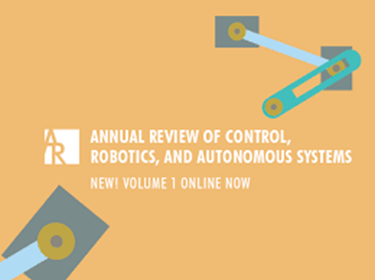基于学习控制策略的策略优化理论基础
IF 14
1区 计算机科学
Q1 AUTOMATION & CONTROL SYSTEMS
Annual Review of Control Robotics and Autonomous Systems
Pub Date : 2023-05-03
DOI:10.1146/annurev-control-042920-020021
引用次数: 2
摘要
基于梯度的方法已广泛应用于各种应用领域的系统设计和优化。最近,在控制和强化学习的背景下,研究这些方法的理论性质重新引起了人们的兴趣。本文概述了策略优化的一些最新发展,这是一种基于梯度的反馈控制综合迭代方法,通过强化学习的成功而得到推广。我们采取跨学科的观点,在我们的博览会,连接控制理论,强化学习和大规模优化。我们回顾了一些最近发展的理论结果,关于各种连续控制问题的基于梯度的方法的优化前景,全局收敛和样本复杂性,例如线性二次调节器(LQR),[公式:见文本]控制,风险敏感控制,线性二次高斯(LQG)控制和输出反馈综合。结合这些优化结果,我们还讨论了直接策略优化如何处理基于学习的控制中的稳定性和鲁棒性问题,这是控制工程中的两个主要需求。我们通过指出在学习和控制的交叉点上的一些挑战和机遇来结束调查。本文章由计算机程序翻译,如有差异,请以英文原文为准。
Toward a Theoretical Foundation of Policy Optimization for Learning Control Policies
Gradient-based methods have been widely used for system design and optimization in diverse application domains. Recently, there has been a renewed interest in studying theoretical properties of these methods in the context of control and reinforcement learning. This article surveys some of the recent developments on policy optimization, a gradient-based iterative approach for feedback control synthesis that has been popularized by successes of reinforcement learning. We take an interdisciplinary perspective in our exposition that connects control theory, reinforcement learning, and large-scale optimization. We review a number of recently developed theoretical results on the optimization landscape, global convergence, and sample complexityof gradient-based methods for various continuous control problems, such as the linear quadratic regulator (LQR), [Formula: see text] control, risk-sensitive control, linear quadratic Gaussian (LQG) control, and output feedback synthesis. In conjunction with these optimization results, we also discuss how direct policy optimization handles stability and robustness concerns in learning-based control, two main desiderata in control engineering. We conclude the survey by pointing out several challenges and opportunities at the intersection of learning and control.
求助全文
通过发布文献求助,成功后即可免费获取论文全文。
去求助
来源期刊
CiteScore
28.30
自引率
2.20%
发文量
25
期刊介绍:
The Annual Review of Control, Robotics, and Autonomous Systems offers comprehensive reviews on theoretical and applied developments influencing autonomous and semiautonomous systems engineering. Major areas covered include control, robotics, mechanics, optimization, communication, information theory, machine learning, computing, and signal processing. The journal extends its reach beyond engineering to intersect with fields like biology, neuroscience, and human behavioral sciences. The current volume has transitioned to open access through the Subscribe to Open program, with all articles published under a CC BY license.

 求助内容:
求助内容: 应助结果提醒方式:
应助结果提醒方式:


